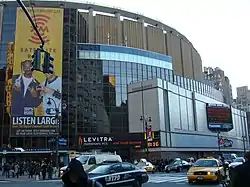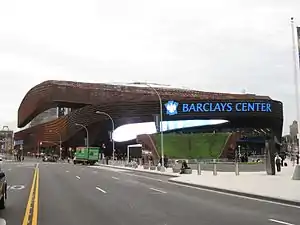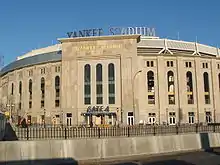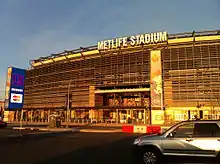Elysian Fields (Hoboken, New Jersey)
Elysian Fields in Hoboken, New Jersey is believed to be the site of the first organized baseball game, giving Hoboken a strong claim to be the birthplace of baseball.[1][2]
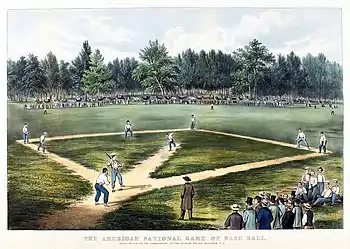 Early baseball game played at Elysian Fields, Hoboken (Currier & Ives lithograph) | |
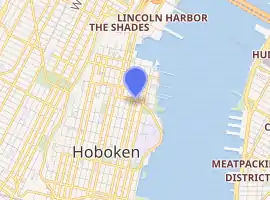
| |
| Location | 11th and Washington Streets Hoboken, New Jersey 07030 |
|---|---|
| Coordinates | 40.74995°N 74.02737°W |
| Owner | Col. John Stevens III, Edwin Augustus Stevens, John Cox Stevens, Robert L. Stevens |
| Capacity | 20,000 (approx.) |
| Opened | by 1845 |
| Closed | 1880s |
| Tenants | |
| New York Knickerbockers, New York Mutuals, New York Metropolitans (1880) | |
History
The Elysian Fields was parkland located on Hoboken's northern riverfront and stretched roughly from present day 9th to 12th Streets and from Washington Street to the Hudson River.[3]
In 1845, Knickerbocker Club of New York City began using Elysian Fields to play baseball due to the lack of suitable grounds across the Hudson River in Manhattan. On June 19, 1846, the Knickerbockers played the New York Nine on these grounds in the first officially recorded, organized game between two clubs; Alexander Cartwright was the umpire. The New York Nine defeated the Knickerbockers 23-1 in four innings.[4] By the 1850s, several Manhattan-based member clubs of the National Association of Base Ball Players were using the grounds as their home field.
In 1856, Elysian Fields was the place that inspired pioneering journalist Henry Chadwick, then a cricket writer for The New York Times, to develop the idea that baseball could be America's National Pastime. As Chadwick relates:
"I chanced to go through Elysian Fields during the progress of a contest between the noted Eagle and Gotham Clubs. The game was being sharply played on both sides, and I watched it with deeper interest that any previous ball match between clubs I had seen. It was not long before I was struck with the idea that base ball was just the game for a national sport for Americans."
Chadwick went on to become the game's preeminent reporter developing baseball's statistics and scoring system.[5]
In 1859, an international cricket match was held with an All-England Eleven[6] as part of an English tour of North America.

In 1865, the grounds hosted a championship match between the Mutual Club of New York and the Atlantic Club of Brooklyn that was attended by an estimated 20,000 fans and captured in the Currier & Ives lithograph The American National Game of Base Ball.
With the construction of two significant baseball parks in Brooklyn enclosed by fences, enabling promoters there to charge admission to games, the prominence of Elysian Fields began to diminish. In 1868, the leading Manhattan club, the New York Mutuals, shifted its home games to the Union Grounds in Brooklyn. In 1880, the founders of the New York Metropolitans and New York Giants finally succeeded in siting a ballpark on Manhattan that became known as the Polo Grounds.
The last recorded professional baseball game at Elysian Fields occurred in 1873. The large parkland area was eventually developed for housing. A small remnant of the park remains bounded on the west by Hudson Street, on the north and east by Frank Sinatra Drive, and on the south by Castle Point Terrace. To the west of Elysian Park at the intersection of 11th and Washington Streets is where the original diamond is thought to have been located. In 2003 a civic improvement organization called the "Hoboken Industry and Business Association" renovated the intersection and placed concrete and bronze "base" monuments in the sidewalk corners at the intersection.[1] A bronze plaque denoting the connection to early baseball was placed in the median strip of 11th Street between first and second bases.[1] The restaurant and music club Maxwell's front door is adjacent to where third base was located.
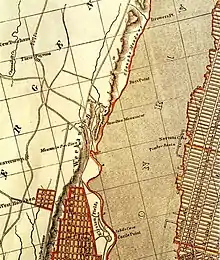
See also
References
- O'Reilly, Charles (May 24, 2005). "Birthplace of Baseball Monument, Hoboken, N.J." Archived from the original on July 24, 2008. Retrieved 2009-07-04.
- Angell, Roger; Anthony Hiss (July 5, 1976). "Bicentennial Beat". The New Yorker. Talk of the Town. Retrieved 2011-02-14.
- Abernathy, Melissa. "Baseball and Hoboken – A Brief History". Hoboken Museum. Retrieved 2020-06-23.
- Acocella, Nicholas (1998). "Hoboken and The Beginnings of Baseball" (PDF). Retrieved 2020-06-23.
- Accorsi, Ernie (February 28, 2008). "Book Review: Andrew Schiff's "The Father of Baseball" Hits a Home Run". Retrieved 2012-03-17.
- Irving, John B. (1859). The international cricket match
 . New York: Vinten. p. xi [scan]
. New York: Vinten. p. xi [scan]  .
.
External links
| Wikimedia Commons has media related to Elysian Fields, Hoboken. |
